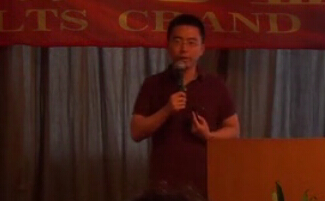雅思口语素材之中国农历新Ⅰ
2014-02-25 11:44 供稿单位: 新航道
出国英语考试有哪些 雅思6.5是什么水平 雅思阅读评分标准 托福阅读评分标准 雅思和托福的区别
Have a happy Chinese New Year!
by Claire Powell
In the west, we celebrate New Year on the 31st December and 1st January. Resolutions are made – I will go to the gym twice a week, I will help my wife with the housework - and probably forgotten! Does that sound like you? Well, there is another chance, as Chinese New Year is celebrated on January 22nd.
Why do the Chinese celebrate New Year at a different time? The traditional Chinese calendar, like many Asian calendars, follows the lunar cycle. So the New Year starts with the New Moon on the first day of the new year and the celebrations end on the full moon fifteen days later. A month is a ‘Moon’ and the cycle lasts about twenty nine or thirty days. In order to catch up with the solar calendar, the Chinese insert an extra month once every seven years out of a nineteen year cycle. This is the same as adding an extra day for a leap year. This is why, according to the solar calendar, the Chinese New Year falls on a different date each year.
The origins of the event are so ancient that they cannot be traced. However, the event is an exciting one, swathed in traditions and rituals.
Preparations begin a month before the date of the Chinese New Year. People buy presents and clothes, decorate their homes and cook traditional food. Homes are cleaned from top to bottom, as any traces of dirt from the previous year could bring bad luck. Doors and windows are repainted, usually in red to ward off evil spirits, and then decorated with sayings to bring happiness, wealth and longevity. Fortune cookies are also baked, containing similar hopeful messages.
Traditionally, each of the fifteen days has a special significance. The first day of the preparations welcomes the gods from the heavens and earth. Many people avoid eating meat on this day because they believe this will ensure a long and happy life.
On the second day, the Chinese pray to their ancestors. They are also especially kind to dogs and feed them well, as this is believed to be the birthday of all dogs.
The third and fourth days are for the sons-in-laws to pay respect to their parents-in-law. The fifth day is called Po Woo. On that day people stay home to welcome the God of Wealth. No one visits families or friends on the fifth day because it will bring bad luck.
Visiting families and friends is resumed between the sixth and the tenth days, and people also visit temples to pray for good fortune and health.
The seventh day is the day for farmers to present their produce. Farmers make a drink from seven types of vegetables to celebrate their work. The seventh day is also considered the birthday of human beings. Noodles and raw fish are eaten to promote long life and success.
People typically have a family reunion dinner on the eighth day and on the ninth day they make offerings to the Jade Emperor. Jade comes in many shades of green and is thought to bring good luck.
During the tenth and twelfth days, families invite friends and relatives for dinner. Probably more food is eaten then than at any other time in the year! Traditional food made at this time has special characteristics, all supposed to enhance the hosts and guests success and good health. Black moss seaweed and dried bean curd are symbols of wealth and happiness. A whole fish represents togetherness and abundance, while a chicken symbolises prosperity. Anything white, such as uncooked tofu is not served, as white is thought to bring bad luck. After all this rich food, on the thirteenth day, people eat simple rice soup and mustard greens to cleanse their system!
The fourteenth day sees people preparing for the Lantern Festival held on the fifteenth night, when traditional Chinese lanterns are displayed and fireworks light the sky in a blaze of colour. Parents give children money in lucky red envelopes and families visit their neighbours to offer greetings.
The message from the Chinese New Year celebrations is one of peace and happiness for family members and friends. It is a time for family and friends to unite and give thanks for their good fortune, as well as a chance to wish that their good luck continues!
Do you celebrate the Chinese New Year? If so, tell us more about it. Do you celebrate New Year in a different way? If so, tell us more about it.
以上就是新航道雅思频道为大家整理的雅思口语素材之中国农历新Ⅰ,希望对大家有帮助,更多资讯、资料请访问新航道雅思口语频道 https://www.xhd.cn/ielts/kouyu/
- 上一篇:雅思口语话题之special gift
- 下一篇:雅思口语素材之中国农历新Ⅱ
分享到:

- 新航道,英语成功之道。时间获取新航道英语学习资料和新鲜资讯,请在微信公众账号中搜索「新航道英语」或者「xhdenglish」,或用手机扫描左方二维码,即可获得新航道每日精华内容推送和英语学习经验分享,并参与新航道举办的各项活动。
责编:李术
猜您喜欢:
图文资讯:
精彩专题
更多视频荟萃
更多
-
新航道姚骏鹏-雅思阅读高分攻略
时长:03-06

-
新航道陈侃侃-雅思口语要有范儿
时长:03-06

-
【3分钟学雅思】王大锤告诉你为啥药不能停
时长:01-12

-
【3分钟学雅思】全世界个感官餐厅
时长:01-12
热门文章
更多
-
8月31日雅思广州考机考初体验
选择机考模式的考生将通过机考模式参加听...








